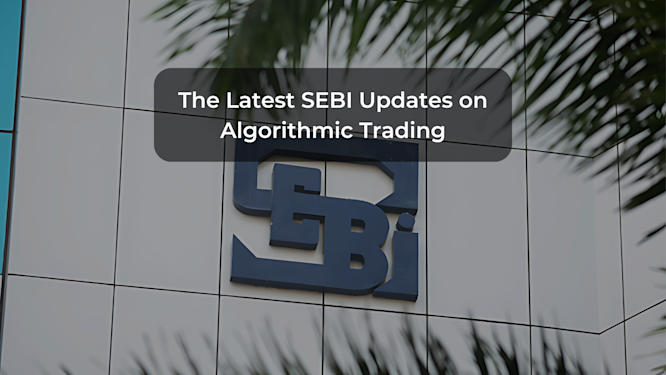The Latest SEBI Updates on Algorithmic Trading
Algo Trading Specifics
Algorithmic trading, also known as algo trading, has revolutionized the way financial markets operate, offering speed, efficiency, and precision that manual trading cannot match. While traditionally dominated by institutional investors, there is a growing demand among retail investors to access these advanced trading tools. Responding to this shift, the Securities and Exchange Board of India (SEBI) has proposed a regulatory framework to facilitate retail participation in algo trading. This blog explores the key highlights of SEBI's draft circular and its implications for the trading ecosystem.
Background
SEBI introduced algorithmic trading through the Direct Market Access (DMA) Facility to enhance market efficiency and transparency. The benefits included faster order execution, reduced transaction costs, improved audit trails, and better liquidity. However, these facilities were primarily available to institutional investors. Recognizing the increasing interest among retail investors and the potential risks involved, SEBI initiated a comprehensive review of the regulatory framework. This led to the creation of new guidelines aimed at striking a balance between enabling retail participation and ensuring robust safeguards.
Key Highlights of SEBI's Draft Circular
1. Objectives of the Regulatory Framework
Investor Protection: SEBI’s draft circular emphasizes the need to safeguard retail investors against potential risks associated with algorithmic trading. The speed and complexity of automated trading can sometimes lead to technical failures or market volatility, potentially harming individual traders. By setting up stringent guidelines, SEBI aims to ensure that retail investors are protected from market manipulation, sudden price drops, and unauthorized trading practices. The framework seeks to establish robust audit trails, enabling authorities to trace any suspicious activities back to the source, thereby maintaining market integrity.
Market Integrity: Ensuring the integrity of financial markets is a priority for SEBI. The draft circular introduces stringent controls and oversight mechanisms to monitor algorithmic trading activities. This includes implementing a kill switch, a last-resort safety mechanism to halt trading in case of anomalies or system failures. By mandating post-trade monitoring and detailed audit trails for every algo order, SEBI aims to prevent abuses, such as price manipulation and the execution of unauthorized trades. The kill switch can be activated by the exchange or broker if there is evidence of algorithmic errors leading to abnormal market conditions.
Stakeholder Accountability: Defining the roles and responsibilities of all parties involved—investors, brokers, algo providers, and Market Infrastructure Institutions (MIIs)—is crucial to ensure a safe trading environment. SEBI’s guidelines clarify these roles, placing the onus on brokers to oversee the algo trading activities of their clients. Brokers must obtain prior approval from stock exchanges for each algo they offer, tag all orders with unique identifiers, and ensure that their systems can detect and categorize orders exceeding specified thresholds. This way, brokers act as the first line of defense in protecting retail investors from misuse of algorithmic strategies.
2. Roles and Responsibilities of Stock Brokers
Stock brokers play a pivotal role in facilitating algo trading for retail investors. Under the new framework, brokers must obtain prior approval from stock exchanges for each algo they offer. This ensures that the algorithms used are transparent, replicable, and adhere to the guidelines set by SEBI. The approval process involves submitting comprehensive documentation detailing the logic behind the algo, including its risk parameters and intended use cases. This documentation helps regulators understand the potential impact of the algorithm on market stability.
Tagging all algo orders with a unique identifier is another critical requirement. This practice establishes a clear audit trail, making it easier for SEBI to monitor trading activities and detect any unusual patterns that could indicate market manipulation. Brokers must also seek exchange approval for modifications to approved algorithms or related systems to ensure consistency in execution. By maintaining these audit trails, brokers contribute to greater transparency and accountability in the market.
Brokers are also responsible for handling complaints related to algo providers. Since brokers act as agents of the investor, they must investigate and resolve any disputes that arise between the investor and the algorithm provider. This role extends beyond simply executing trades; brokers must actively manage the risks associated with algorithmic trading on behalf of their clients.
3. Use of APIs in Algo Trading
Application Programming Interfaces (APIs) are a critical component of algo trading. SEBI’s guidelines mandate that brokers must act as principals, while algo providers or vendors serve as agents. This delineation is designed to prevent conflicts of interest and ensure that brokers remain accountable for the execution and monitoring of orders. All orders originating through APIs exceeding a specified threshold will be treated as algo orders and tagged with unique identifiers to maintain transparency.
APIs must use OAuth-based authentication and static IP whitelisting for enhanced security. This ensures that only authorized parties can access the trading systems, reducing the risk of unauthorized trades. SEBI’s requirement for two-factor authentication for API access aims to prevent potential breaches. By restricting open APIs and mandating unique vendor-client-specific API keys, SEBI prevents unauthorized access, ensuring that the trading process remains secure and traceable.
4. Retail Algo Developers
Retail investors who develop their own algorithms using programming knowledge must: register their algorithms with the stock exchange through their broker. This process involves submitting the algorithm’s code, purpose, and risk parameters to demonstrate its viability and safety. Once registered, retail algo developers can only use their algorithms for personal trading and for family members (spouse, dependent children, and parents). This restriction helps prevent the misuse of sophisticated trading strategies that could negatively impact the market.
5. Registration and Empanelment of Algo Providers
Algo providers, including fintech firms, must meet stringent eligibility criteria to be empaneled with stock exchanges. This ensures better oversight and accountability. Responsibilities include:
Providing transparent and replicable algorithms (white-box algos) or maintaining research reports for non-replicable algorithms (black-box algos). White-box algos are those where the logic is publicly known and can be verified, which helps regulators and brokers understand the potential impact on market stability. Black-box algos, on the other hand, are more complex and often involve proprietary logic that isn’t disclosed to the public.
Registering any significant changes in algo logic as a new algorithm. This ensures that SEBI and the stock exchanges can keep track of algorithmic changes that might affect market behavior. By requiring re-registration for any changes, SEBI can maintain a comprehensive database of all algorithmic strategies in use.
Compliance with broker and exchange guidelines is mandatory. Algo providers must adhere to the regulations set by SEBI, including submitting regular reports on trading volumes, execution times, and any anomalies. This allows regulators to monitor the effectiveness of the algorithms and the risks they pose. Resolving complaints is another critical responsibility, ensuring that any malpractices are addressed swiftly and effectively.
6. Categorization of Algos
Algorithms are classified into two categories:
White-Box Algos: These are execution algorithms with transparent and replicable logic. The clarity of these algorithms allows regulators to monitor them effectively and ensures that brokers can accurately explain their operation to investors. This transparency also helps in understanding the potential risks and limitations associated with each algorithm.
Black-Box Algos: These are non-replicable algorithms with undisclosed logic. Algo providers offering black-box algos must: Register as Research Analysts, maintaining detailed research reports for each algo. These reports include detailed explanations of the algorithm’s purpose, how it works, and the risks involved. Re-registering and maintaining these reports for any changes in the algorithm’s logic ensures that the regulators can keep up with the rapid evolution of trading strategies.
7. Responsibilities of Stock Exchanges
Exchanges play a central role in supervising algo trading. SEBI mandates post-trade monitoring of algorithmic orders and trades. This process involves tracking each order to ensure it matches the intended parameters and identifying any deviations that could lead to market manipulation. By implementing this monitoring, exchanges can provide a level of oversight similar to that available for manual trading, ensuring that the automated systems do not disrupt market stability.
Implementation of a kill switch as a last-resort safety mechanism is crucial for handling algorithmic errors. If an algorithm causes significant disruptions, the kill switch can be activated to halt trading for a particular algo or across the entire exchange. This mechanism helps prevent cascading failures that could impact market integrity. Exchanges are also required to define roles and responsibilities of brokers and empaneled vendors, ensuring that everyone involved in the trading process understands their obligations and the consequences of non-compliance.
Establishing Standard Operating Procedures (SOPs) for algo testing and registration is vital. This includes defining turnaround times (TAT) for registering algorithms on a fast-track or normal basis. Fast-track registration is designed for algorithms with a limited impact on the market, ensuring quick deployment for short-term strategies, while regular registration allows for a more thorough review process. This approach helps balance the need for speed with the need for accuracy in assessing the impact of algorithms on market behavior.
8. Public Comments
SEBI has invited public feedback on the draft circular. Comments can be submitted via an online form or email by January 3, 2025. This reflects SEBI’s collaborative approach in shaping the regulatory framework. By engaging with industry stakeholders, SEBI aims to create a comprehensive set of guidelines that addresses concerns from all parties involved—retail investors, brokers, algo providers, and Market Infrastructure Institutions (MIIs). This consultation process helps SEBI to understand practical challenges, nuances, and specific needs, allowing the guidelines to be more effective in practice.
9. Implementation Timeline
The framework is set to take effect from January 2025, with stock exchanges and brokers required to align their systems and procedures by this date. Implementation standards will be developed under the aegis of SEBI’s Technical Advisory Committee, providing a transparent process for testing new algorithms and ensuring compliance with the new regulations. This timeline gives sufficient time for market participants to adapt their systems and processes, ensuring a smooth transition to the new regulatory environment.
Implications for the Trading Ecosystem
1. Market Liquidity: The inclusion of retail investors in algo trading is expected to boost market liquidity. With more participants, especially in the retail segment, markets are likely to see improved depth and reduced volatility. However, this influx must be monitored closely to avoid sudden spikes in trading volumes that could disrupt market stability.
2. Market Access: SEBI’s framework democratizes access to algo trading. Retail investors now have the opportunity to use sophisticated trading strategies, traditionally reserved for institutional players. This could encourage more individuals to engage actively in the markets, providing a broader audience for financial products and services.
3. Risk Management: The stringent guidelines set by SEBI are designed to mitigate the risks associated with algo trading. By enforcing detailed audit trails, kill switches, and comprehensive role definitions, SEBI ensures that the market remains resilient to disruptions. Algo providers, brokers, and investors must be vigilant in adhering to these new rules to avoid penalties and maintain market integrity.
4. Technological Implications: The framework requires significant investment in technology by stock exchanges and brokers. Adopting SEBI’s guidelines may necessitate updates to trading systems, enhanced cybersecurity measures, and the integration of new data analytics tools for post-trade monitoring. This could drive innovation in the development of trading systems, benefiting both retail and institutional traders.
To Sum Up
The SEBI draft circular on algorithmic trading marks a significant step towards inclusive financial markets in India. By establishing a clear regulatory framework, SEBI ensures that retail investors can access the benefits of algorithmic trading while safeguarding market integrity. The adoption of these guidelines will require collaboration across the industry, including brokers, exchanges, algo providers, and retail investors. As SEBI continues to evolve its regulations, it is crucial for all stakeholders to remain informed and proactive in adapting to these changes. This regulatory development not only reflects SEBI’s commitment to protecting retail investors but also underscores the dynamic nature of the Indian financial market.



